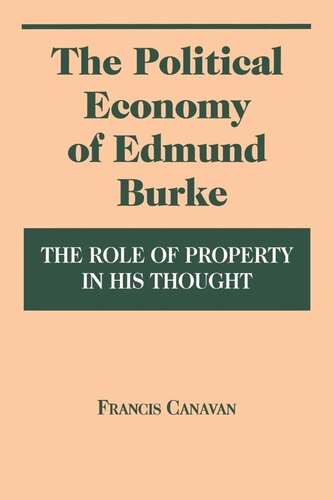

Most ebook files are in PDF format, so you can easily read them using various software such as Foxit Reader or directly on the Google Chrome browser.
Some ebook files are released by publishers in other formats such as .awz, .mobi, .epub, .fb2, etc. You may need to install specific software to read these formats on mobile/PC, such as Calibre.
Please read the tutorial at this link: https://ebookbell.com/faq
We offer FREE conversion to the popular formats you request; however, this may take some time. Therefore, right after payment, please email us, and we will try to provide the service as quickly as possible.
For some exceptional file formats or broken links (if any), please refrain from opening any disputes. Instead, email us first, and we will try to assist within a maximum of 6 hours.
EbookBell Team

4.3
48 reviewsIn Edmund Burke: A Bibliography of Secondary Studies to 1982 Clara Gandy and Peter Stanlis write, "One of the large unanswered questions is how Burke's economic theory is related to his political theory, and whether they are complementary or contradictory." Canavan is the first to offer a book-length treatment of this question, and in so doing, he places the strength of his argument largely on primary sources rather than a patchwork of previous interpretations. Canavan aims to show that Burke's own emphasis was no on capitalistic laissez-fair economics, as has been assumen, but that his goals were primarily political and cultural. Namely, Burke sought the preservation and development of an aristocratic and Christian civilization supported economically by a leading class of landed property owners.
This study projects a new profile of Burke which challenges C.B. Macpherson's sketch of him as a bourgeois capitalist, or, as depicted by J.B. Plumb and Frank O'Gorman, as a hired philsopher of the Whig Oligarchy. Nor does Canavan's study present the philosopher as one who would "declare war on the poor," as Gertrude Himmelfarb charged in her The Idea of Poverty. Burke emerges from Canavan's treatment as a Whiug who admired paternalistic government by the rich and virtuous whom he felt would govern as trustees for the benefit of the whole people. Burke did not support the notion that property by monopolized by any one class in society, but wanted the wealthy to empower intermediary institutions which would hold in check the control of the expansive state, whether that meant the Crown in Britain or the revolutionary state in France.